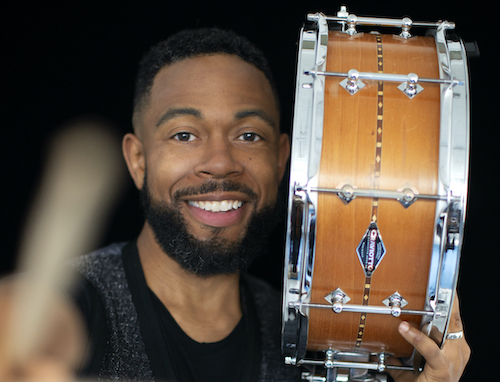Jan 13, 2026 2:09 PM
More Trump-Kennedy Center Cancellations
The fallout from the renaming of the John F. Kennedy Center for the Performing Arts to include President Donald…

Jerome Jennings follows up his 2016 release, The Beast, with Solidarity.
(Photo: John Abbott)Jerome Jennings stays focused on his goals. After getting his start in his home state of Ohio, he earned degrees from Rutgers University and The Juilliard School and is now firmly ensconced on the New York scene, having earned a reputation as a creative drummer who’s up for just about anything. Jennings has worked with legends ranging from Sonny Rollins, Benny Golson and Hank Jones to Earth, Wind & Fire vocalist Philip Bailey. “It’s surreal,” he said of getting summoned for high-profile projects, “but you can’t get too caught up in the call, because you have work to do.”
In recent years, Jennings has begun to assert himself as a leader. His first album, 2016’s The Beast (Iola), showcased a band made up of longtime friends and collaborators, including trumpeter Sean Jones, tenor saxophonist Howard Wiley, trombonist Dion Tucker, pianist Christian Sands and bassist Christian McBride, with vocalist Jazzmeia Horn dropping in for a version of the standard “You Don’t Know What Love Is.”
Although it presented itself as a straightforward hard-bop record with one surprising track—a beautiful arrangement of New Edition’s 1984 r&b hit “Cool It Now”—The Beast wrapped a social message inside hardcore acoustic jazz. It included a blazing version of Freddie Hubbard’s “The Core,” written as a tribute to the Congress of Racial Equality, and the title piece was inspired by an encounter Jennings had with the police. The album’s final track, “New Beginnings,” laid an impassioned speech by actor/activist Jesse Williams, from the 2016 BET Awards, over the music.
“In the liner notes, you’ll see that it deals with the undercurrent of police violence and people who have been caught up in the system, many times falsely,” Jennings said. “Musically, I think I got the point across that there’s somebody out here who still wants to swing and play acoustic music, but I also wanted to make a social statement.”
His new album, Solidarity (Iola), is even more socially engaged than its predecessor. The new tracks carry dedications to prominent female and LGBTQ figures, including murdered Brazilian politician Marielle Franco, philosopher Audre Lorde and transgender activist Marsha P. Johnson. Jennings includes Dizzy Gillespie’s “Bebop” to root the music in jazz history and Shanice’s 1991 r&b hit “I Love Your Smile”—the original recording of which featured a saxophone solo from Branford Marsalis—for something more modern.
The band on Solidarity includes trumpeter Josh Evans, saxophonist Stacy Dillard, trombonist Andrae Murchison and pianist Zaccai Curtis. Only McBride returns from The Beast. Given the subject matter, Jennings wanted female voices represented, so he invited guest saxophonists Tia Fuller and Camille Thurman and bassist Endea Owens. “If you do a record that’s dedicated to women, and women of color, how can you not have women on the record? You need that energy, because it’s gonna shape things ... and also, I have to have their OK, I feel.”
Thurman, who contributes vocals on “I Love Your Smile,” said, “I was very happy when he told me that I would be singing this song. I remember hearing and singing it as a child. I also remember memorizing and scatting Branford’s solo. This was a classic for all ’80s babies.”
The most stunning track on Solidarity, though, is “Convo With Senator Flowers.” Jennings sets a speech by Arkansas Sen. Stephanie Flowers, protesting open-carry gun laws, to a drum solo. It wasn’t an improvisation, though; it was a painstakingly crafted composition. “This was probably one of the most challenging pieces I’ve ever gotten together,” Jennings said, “because it’s not an exercise—you’re actually playing the rhythm of someone’s speech. It took me a while to work that up. It was very much premeditated and methodical.” It fits with the rest of Solidarity in that he’s foregrounding women’s narratives and, in this case, a woman’s actual voice, lending support without ever dominating the conversation. DB

Belá Fleck during an interview with Fredrika Whitfield on CNN.
Jan 13, 2026 2:09 PM
The fallout from the renaming of the John F. Kennedy Center for the Performing Arts to include President Donald…

Peplowski first came to prominence in legacy swing bands, including the final iteration of the Benny Goodman Orchestra, before beginning a solo career in the late 1980s.
Feb 3, 2026 12:10 AM
Ken Peplowski, a clarinetist and tenor saxophonist who straddled the worlds of traditional and modern jazz, died Feb. 2…

The success of Oregon’s first album, 1971’s Music Of Another Present Era, allowed Towner to establish a solo career.
Jan 19, 2026 5:02 PM
Ralph Towner, a guitarist and composer who blended multiple genres, including jazz — and throughout them all remained…

Rico’s Anti-Microbial Instrument Swab
Jan 19, 2026 2:48 PM
With this year’s NAMM Show right around the corner, we can look forward to plenty of new and innovative instruments…

Richie Beirach was particularly renowned for his approach to chromatic harmony, which he used to improvise reharmonizations of originals and standards.
Jan 27, 2026 11:19 AM
Richie Beirach, a pianist and composer who channeled a knowledge of modern classical music into his jazz practice,…